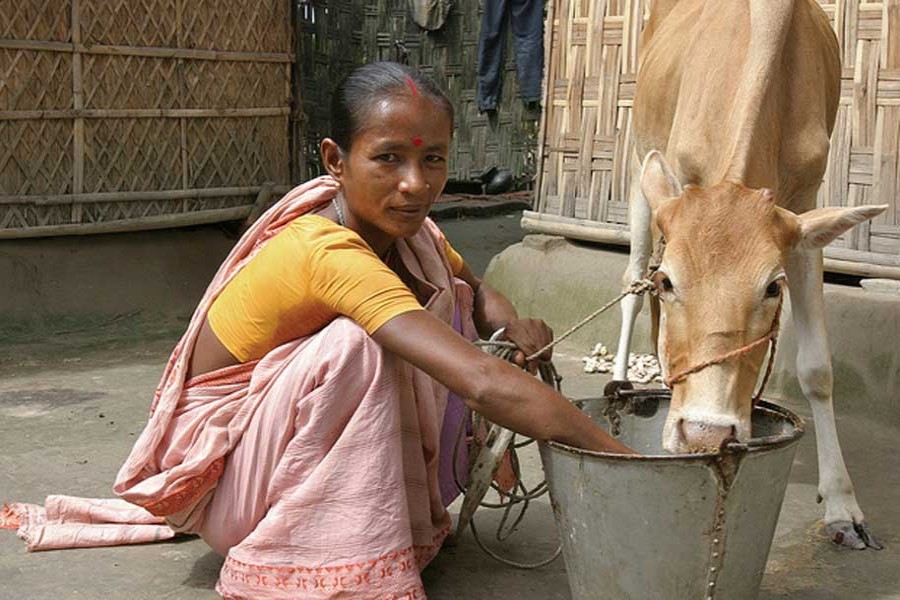Women’s lengthy involvement in unpaid care work compared to that of men gets in the way of their economic empowerment, a study has found.
Women in Bangladesh engage in 6.3 hours of 'unpaid care work' out of a total 15.3 hours they work daily, which is 41.4 per cent of their total work time, the study reveals.
On the other hand, men spend 1.1 hours per day on 'unpaid care work', a mere 7.0 per cent of their total work time of 15.3 hours.
Similarly, in India, women spend an average of 5.1 hours a day on household and other unpaid care work, while men only spend 24 minutes on the same, reports UNB citing the findings of the study.
ActionAid, Bangladesh shared the findings of a study titled "Incorporation of Women's Economic Empowerment and Unpaid Care Work into regional polices: South Asia" in a city hotel on Saturday.
Chief researcher of Gender Studies cluster at BRAC Institute of Governance and Development (BIGD) Dr Simeen Mahmud said women usually do many household works and they do invest times in other works.
"The research findings say women spend much time than men in works. Women remain under pressure for their household works which lagging them behind economically, socially and politically," she said while commenting on the research findings.
ActionAid Bangladesh country director Farah Kabir said, "We do not respect women's household works and we pretend its women's job. Their works are not being evaluated, their contribution is not recognised in the economy."
Meanwhile, she said, the state is ignoring the issue in its policy and laws. "As a result, women get stuck within house."
Senior Researcher of Bangladesh Institute of Development Studies (BIDS) Dr Nazneen Ahmed said the process of women empowerment is being impeded as there is no recognition of women's works at home.
"So, there should be separate and specific calculation on their contributions to household works," she said.
Director General (SAARC & BIMSTEC) at the Foreign Ministry Md Shamsul Haque said the issue of women development is incorporated in a number of policies of the Saarc but there is a need for specific initiative recognising women's household works. "For this, we need social movement from the grassroots level."
The study findings say the gendered nature and unequal burden of Unpaid Care Work (UCW) is a key challenge to attaining women's economic empowerment (WEE) in South Asia.
Given the disproportionate amount of time poor rural women in South Asia spend on Unpaid Care Work, they are unable to secure safe, fair employment, and are often forced to compromise their health and leisure time to secure paid work, it said.
The report said any strategies to achieve women's economic empowerment in rural South Asia must therefore take into consideration Unpaid Care Work and its impacts on women in the region.
Unpaid Care Work is an inherently gendered phenomenon: a clear majority of uncompensated, unrecognised and undervalued care work is carried out by women.
Among the three countries of South Asia, for example, position of women of Nepal is first (6.6 hours), Bangladesh is second (6.3 hours) and India is third (5.1 hours) in terms of spending time per day in unpaid care work.
On the other hand, men spending time on Unpaid Care Work per day is 2.1 hours in Nepal, 1.1 hours in Bangladesh, and 0.4 (24 minutes) in India.
The gender gap based on above data on time spent in unpaid care work between men and women in South Asia is highest in Bangladesh (5.2 hours), second highest in India (4.7 hours) and lowest in Nepal (4.5 hours).
If the International labour Organisation (ILO) norms of 48 hours a week are applied, as per the surveys used, women are highly time stretched, and in excess of ILO's stipulated maximum, while men are within the limits of the norm.
Women get much less personal or leisure time a day, and less time to sleep and rest as a result.
The report recommended recognising, reducing and redistributing women's Unpaid Care Work in regional frameworks and National policies like counting Unpaid Care work in GDP.
It said interventions must also include consider the intersectionality of women's identities as mothers, farmers, workers and living with disability and others, so that a holistic approach is undertaken when working with rural women.
The report recommended reducing physical and safety related vulnerabilities for rural women.
It is important that women have a safe working environment, free from violence and harassment, and security in mobility and participation, it said.
It said women should have a stake and a say in crucial processes of decision making, including the types of jobs created and made available to them, and the macro-economic climate within which labour is transacted.
Regional and national civil society actors must constantly question the assumption that focusing on inclusion into the existing neoliberal, often exploitative, market labour force will necessarily lead to positive empowerment outcomes, the report said.


